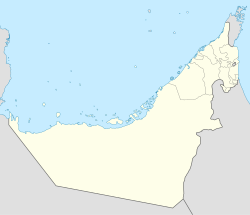A preliminary investigation by Emirati authorities supported the Houthis' claims of a drone attack, as well as the presence of both ballistic and cruise missiles. [10]
Reactions
The attack received outrage from the Gulf Cooperation Council, especially Saudi Arabia, which described the events as a "cowardly terrorist attack". [61] Saudi Colonel Turki Al-Maliki described the attack as a war crime. The Saudi led coalition announced that a comprehensive deterrence operation would be carried out in response to the attack. [14] Bahrain, Oman, Qatar, Iraq and Kuwait all issued strong denouncements of the attacks in Abu Dhabi. They were joined in by the Arab League and the Organisation of Islamic Cooperation. [62] [15] [63] [64]
Yemen, which is where the Houthis operate, strongly denounced the incident, describing it as an escalation of the war and an act of terror. [65]
Soon after the attack was reported, Egyptian Foreign Minister Sameh Shoukry denounced the incident, voicing solidarity with the Emirates. [4] [62]
Indian Minister of External Affairs, S. Jaishankar termed the attacked to be "unacceptable" and expressed "shock and deepest consolidates to the ones who died" while "prayed for faster recovery of the injured". [66]
American National Security Advisor Jake Sullivan called for the perpetrators to be held accountable and that American "commitment to the security of the UAE is unwavering, and we stand beside our Emirati partners against all threats to their territory." [67]
Israeli prime minister Naftali Bennett tweeted his condemnation of the "terrorist drone attack," sending a letter of condolence to Mohamed bin Zayed via his spokesman. [22] [15] The next day he told the World Economic Forum in a speech that Iran was financing terror operations abroad, which has been interpreted as a reference to the attack in Abu Dhabi. [68]
Pakistani Prime Minister Imran Khan called Sheikh Mohamed bin Zayed, telling him he was shocked by the attacks and stood in solidarity with the Emirates. Pakistan had lost one citizen in the attacks. [69] On January 18 Russian spokeswoman Maria Zakharova condemned the "provocation against civil infrastructure facilities in the friendly United Arab Emirates." Russia expressed concerns that such attacks could expand from the UAE to other nations. [65] [70] Duma member Leonid Slutsky voiced significant criticism of the Houthis, warning that any further attacks would result in the derailment of the Yemeni peace process. [71] Turkey's foreign spokesman, Mevlüt Çavuşoğlu, had a phone call with Sheikh Mohamed bin Zayed, in which he decried the event. [72] [65]
Iran responded later than other countries. The day after the attack, the Iranian Foreign Ministry issued a statement that the "solution to any regional crisis is not to resort to war and violence", in response to what it termed to be novel "Yemen-linked developments." While the statement did not explicitly mention the attack on Abu Dhabi, the event was implied. [7]
In addition to these countries, Argentina, [73] Ethiopia, [74] Japan, Germany, Tunisia, [75] Lebanon, Singapore, [65] Malaysia, [76] Jordan, Sudan, Italy, the United Kingdom, the European Union and Morocco [77] expressed strong condemnations of the attacks. [69] [62] [64]
United Nations Secretary General António Guterres denounced the events while calling for stability to be maintained in the region. In a statement Guterres condemned the attack, calling attacks on civilians and civilian infrastructure as prohibited by international law. [78] French foreign affairs minister Jean-Yves Le Drian voiced similar sentiments. [44]
Houthi spokesman Mohammed Abdel Salam justified the attack, warning of any further attempt by pro-Saudi forces to intervene in Yemen against the Houthis, and threatened to launch more attacks. [14]
The strikes were congratulated by a number of Iraqi Shi'a paramilitaries, including Kata'ib Hezbollah. [56]
A week ahead of the 2021 FIFA Club World Cup, the United States raised a travel warning, citing the missile and drone attacks by Houthi rebels in the UAE. The Biden administration raised a highest level of warning against travel to the UAE, due to the threat of Houthi attacks and COVID-19 cases in the country. [79]
